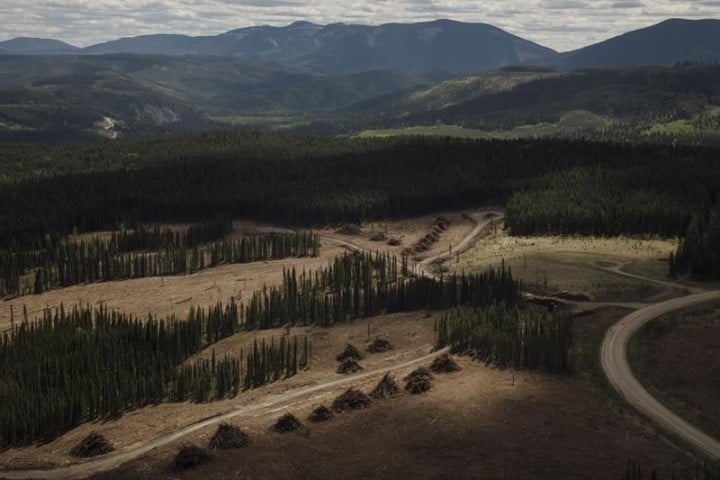EDMONTON — Supporters of open-pit coal mining say there’s a chance new mines could be built in Alberta’s Rockies after comments from the province’s new premier.
“We’re hoping with this little window with Danielle (Smith) that we can crack that open,” said Eric Lowther, a southern Alberta resident and president of Citizens Supportive of Crowsnest Coal.
Coal mining in the province’s beloved Rockies was blocked in February 2021 by ministerial order. The order was triggered by a public outcry after thousands of hectares of summits and foothills were permitted for exploration that was previously encouraged by the United Conservative Party government.
That outcry — which united urban environmentalists, ranchers, First Nations and municipalities — resulted in a coal policy panel that recommended no new mines be developed before land use plans are in place. Opponents worried developments would contaminate the headwaters of much of Alberta’s water supply and despoil the landscape.
However, while campaigning in the party’s recent leadership campaign, Smith visited the southern Alberta communities of Crowsnest Pass and Pincher Creek. She reportedlytold people she would be open to revisiting the idea if she became premier, especially on lands that have been previously disturbed.
Many in Crowsnest Passwere disappointed after a joint federal-provincial review panel turned down an application for the proposed Grassy Mountain coal mine.
“If there was a strong referendum in the area in support of it, (Smith) would be more inclined to help us out,” said Lowther, who was present at both meetings.
Crowsnest Pass Mayor Blair Painter said he asked Smith about coal at the public meeting in his community. He refused to say what she told him, although others at the meeting contacted by The Canadian Press confirmed Lowther’s version of her remarks.
Lowther said Smith repeated them late last month at a meeting in Pincher Creek.
“She said to a number of us if there was a referendum in the area in support of coal, she’d be more willing to bring (the issue) forward.”
Some Albertans have also said on social media that Smith made similar statements to them during the leadership campaign.
Smith was asked during the campaign if she supported new or expanded coal mines in the Rockies. She did not commit either way, telling the Edmonton Journal that she would consult UCP legislature members before making any changes.
Contacted Wednesday, Smith’s spokeswoman Rebecca Polak didn’t address Smith’s purported statements on coal.
“The premier travelled the province throughout her leadership campaign and spoke with Albertans on a variety of issues and topics,” she said in an email.
“Responsible resource development is a top priority for Alberta’s government. Premier Smith continues to be briefed on this important topic and will be meeting with her caucus and future cabinet in the coming weeks, including the minister of environment, to discuss this matter further.”
Smith is expected to announce her new cabinet later this week. A new energy minister could withdraw the ministerial order.
University of Calgary resource law professor Martin Olszynski said if Smith instructed a new energy minister to rescind the moratorium order, any new mines would still have to go through a lengthy environmental review, which would likely include the federal government.
As well, Olszynski said there’s no legal channel Smith could use to revive Grassy Mountain. The decision to deny the proposal a permit has been upheld in two courts, including the Supreme Court of Canada, he said.
“There’s basically nothing she can do about the (federal) denial of a permit for Grassy,” he said.
Coal mining opponents decried Smith’s apparent willingness to consider development.
“It shows how out-of-touch she is with mainstream Albertans,” said New Democrat environment critic Marlin Schmidt.
Schmidt pointed to the work of Alberta’s panel on coal policy committee, which received more than 1,000 emailed documents and 170 written submissions, most opposing open-pit coal mines in the Rockies.
The panel, which reported last spring, found 85 per cent of Albertans indicated that they were “not at all confident” that coal exploration and development are properly regulated.
“To even bring this up as a possibility after such extensive consultations … it boggles the mind to think (Smith believes) this is something that would pass muster with Albertans.”
Katie Morrison of the Canadian Parks and Wilderness Society urged Smith to follow the panel’s recommendations, which suggest comprehensive land use plans should be developed for the region before mines are permitted.
“The majority of Albertans across the province have been very clear that they do not want new coal mines in our headwaters,” she said.
“I would encourage (Smith) to closely examine the documents of the (panel) … for direction on what Albertans want to see with respect to coal.”
This report by The Canadian Press was first published Oct. 19, 2022.
— Follow Bob Weber on Twitter at @row1960
Bob Weber, The Canadian Press
